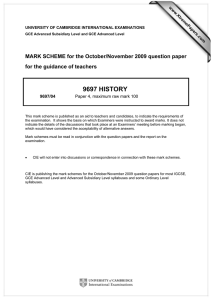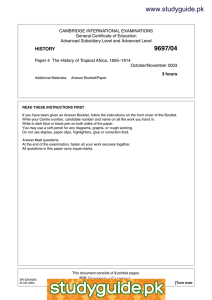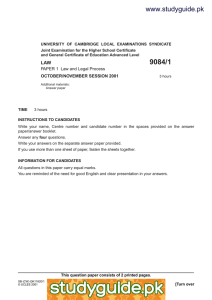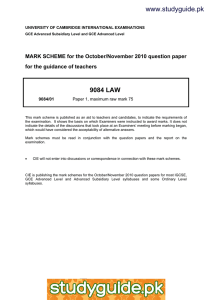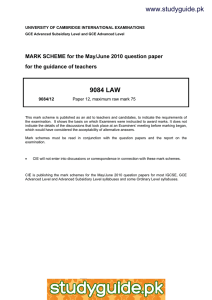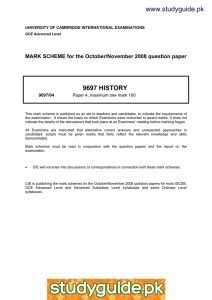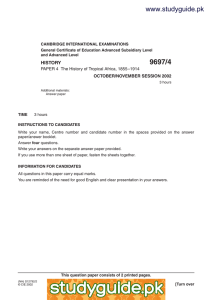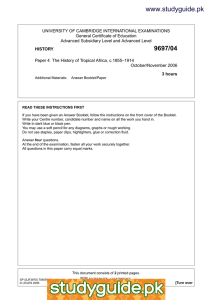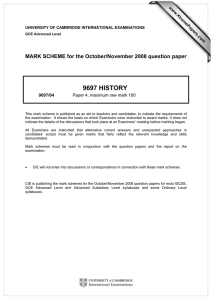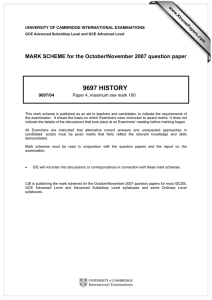www.studyguide.pk 9697 HISTORY
advertisement
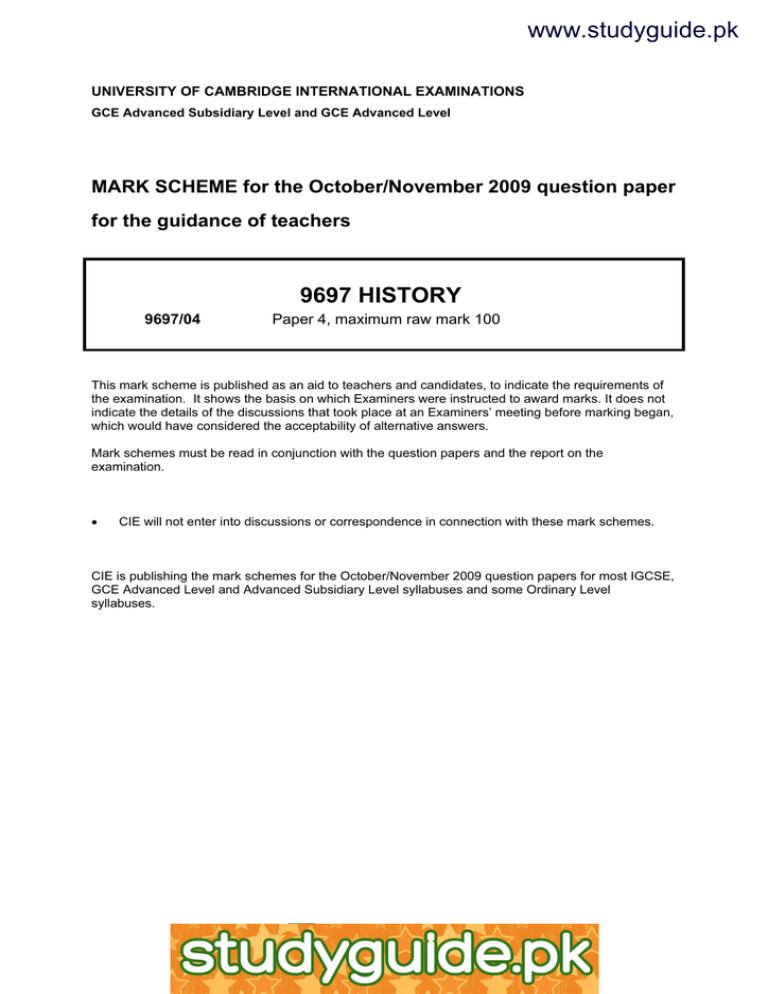
www.studyguide.pk UNIVERSITY OF CAMBRIDGE INTERNATIONAL EXAMINATIONS GCE Advanced Subsidiary Level and GCE Advanced Level MARK SCHEME for the October/November 2009 question paper for the guidance of teachers 9697 HISTORY 9697/04 Paper 4, maximum raw mark 100 This mark scheme is published as an aid to teachers and candidates, to indicate the requirements of the examination. It shows the basis on which Examiners were instructed to award marks. It does not indicate the details of the discussions that took place at an Examiners’ meeting before marking began, which would have considered the acceptability of alternative answers. Mark schemes must be read in conjunction with the question papers and the report on the examination. • CIE will not enter into discussions or correspondence in connection with these mark schemes. CIE is publishing the mark schemes for the October/November 2009 question papers for most IGCSE, GCE Advanced Level and Advanced Subsidiary Level syllabuses and some Ordinary Level syllabuses. www.xtremepapers.net www.studyguide.pk Page 2 Mark Scheme: Teachers’ version GCE A/AS LEVEL – October/November 2009 Syllabus 9697 Paper 04 Generic mark bands for Essay Questions Examiners will assess which Level of Response best reflects most of the answer. An answer will not be required to demonstrate all of the descriptors in a particular Level to qualify for a Mark Band. In bands of 3 marks, examiners will normally award the middle mark, moderating it up or down according to the particular qualities of the answer. In bands of 2 marks, examiners should award the lower mark if an answer just deserves the band and a higher mark if the answer is clearly in that band. Band 1 Marks 21–25 2 18–20 3 16–17 4 14–15 5 11–13 6 8–10 7 0–7 Levels of Response The approach will be consistently analytical or explanatory rather than descriptive or narrative. Essays will be fully relevant. The argument will be structured coherently and supported by very appropriate factual material and ideas. The writing will be accurate. At the lower end of the band, there may be some weaker sections but the overall quality will show that the candidate is in control of the argument. The best answers must be awarded 25 marks. Essays will be focused clearly on the demands of the question but there will be some unevenness. The approach will be mostly analytical or explanatory rather than descriptive or narrative. The answer will be mostly relevant. Most of the argument will be structured coherently and supported by largely accurate factual material. The impression will be that a good solid answer has been provided. Essays will reflect a clear understanding of the question and a fair attempt to provide an argument and factual knowledge to answer it. The approach will contain analysis or explanation but there will be some heavily descriptive or narrative passages. The answer will be largely relevant. Essays will achieve a genuine argument but may lack balance and depth in factual knowledge. Most of the answer will be structured satisfactorily but some parts may lack full coherence. Essays will indicate attempts to argue relevantly although often implicitly. The approach will depend more on some heavily descriptive or narrative passages than on analysis or explanation, which may be limited to introductions and conclusions. Factual material, sometimes very full, will be used to impart information or describe events rather than to address directly the requirements of the question. The structure of the argument could be organised more effectively. Essays will offer some appropriate elements but there will be little attempt generally to link factual material to the requirements of the question. The approach will lack analysis and the quality of the description or narrative, although sufficiently accurate and relevant to the topic if not the particular question, will not be linked effectively to the argument. The structure will show weaknesses and the treatment of topics within the answer will be unbalanced. Essays will not be properly focused on the requirements of the question. There may be many unsupported assertions and commentaries that lack sufficient factual support. The argument may be of limited relevance to the topic and there may be confusion about the implications of the question. Essays will be characterised by significant irrelevance or arguments which do not begin to make significant points. The answers may be largely fragmentary and incoherent. Marks at the bottom of this Band will be given very rarely because even the most wayward and fragmentary answers usually make at least a few valid points. © UCLES 2009 www.xtremepapers.net www.studyguide.pk Page 3 1 Mark Scheme: Teachers’ version GCE A/AS LEVEL – October/November 2009 Syllabus 9697 Paper 04 What lasting effects did the slave trade have upon the states and people of West Africa? How far did the transition to legitimate trade affect the economic and social development of that region? The question is in two parts and each part requires a measure of analysis and argument, rather than a list. The focus of the question is the effects of both the slave trade and legitimate trade on West African societies during the second half of the nineteenth century. For Bands 1 and 2 candidates must show a balance between both parts of the question, and must provide specific examples to illustrate their analysis. If neither balance nor specific examples are present then a maximum of Band 5 should be awarded. Lasting effects: Candidates should concentrate on the second half of the nineteenth century and may refer to depopulation (particularly of able-bodied citizens), wars between African groups and states (bringing destruction and insecurity to society), the decline of productive indigenous industries (replaced by imported goods), and the dominance of powerful states such as Benin, Dahomey, Asante and Oyo. These ‘effects’ opened the door to European infiltration, colonisation and exploitation. Analysis of the transition to legitimate trade: A more specific analysis is required in this section of the question, and an evaluation of the impact on West Africa of the transition to legitimate trade in groundnuts or palm oil and other such products. Candidates could use developments in Dahomey, Yorubaland and Opobo to illustrate their argument. Those candidates who distinguish between economic and social developments should be rewarded. For the latter, examples will come from developments in Sierra Leone, the increasing scientific interest in the region (e.g. the African Association) and the work of missionary societies in cultural, health and educational fields. 2 Explain why Seyyid Said moved his capital from Oman to Zanzibar. What were the nature and extent of Arab influences upon East Africa following this move? The question requires an explanation of Seyyid Said’s reasons for relocating his capital in the first part of the answer. Part 2 should be more analytical, showing something of the breadth and depth of Arab influences. Band 1 and 2 answers will address both parts of the question and show an awareness of the importance of both negative and positive impacts of Seyyid Said’s rule; the very best candidates might address shorter and longer term effects and reach a final judgement. Reasons for moving: As this move took place in 1840, candidates should not spend too long explaining background, but rather should focus on the advantages of Zanzibar. Natural advantages included a good harbour and water supply, soil and rainfall conditions suitable for the cultivation of popular spices such as cloves, and Seyyid Said’s acute commercial instincts ensured a successful development of this Swahili-Arab base. He said ‘I am nothing but a merchant’ and he was able to see the advantages of the geographical position of Zanzibar. He was able to negotiate trade treaties with the USA, the UK, France and Germany, holding, as he did, exclusive control of mainland trade routes in ivory, slaves, coconuts, copra and palm oil. Arab influences upon East Africa: were both commercially and politically extensive as well as very significant socially. A Swahili-Arab ‘empire’ was built up with an enormous scale of ivory and slave trading. Candidates may well distinguish between the negative and positive impacts of this empire. Negative: wars motivated by slaving disrupted African social and political systems and agricultural production declined. Positive: some pacification of the interior by Arab armies ensued, with new states emerging such as that of Tippu Tip and the Nyamwezi; the spread of Islam and the Swahili language were unifying factors. Also of importance is that Zanzibar provided a gateway into the interior of East and Central Africa for European explorers, traders, missionaries and imperialists. © UCLES 2009 www.xtremepapers.net www.studyguide.pk Page 4 3 Mark Scheme: Teachers’ version GCE A/AS LEVEL – October/November 2009 Syllabus 9697 Paper 04 What factors favoured the growth of Islam and Christianity during this period? Explain the emergence of ‘independent’ African churches. A balanced answer should explain the social, cultural and political reasons for the rapid expansion of both Islam and Christianity during the colonial period and analyse why Africans subsequently felt the need to develop churches of their own. The question offers candidates the opportunity to include factors from both East, West and Central Africa, in addition to wider generalisations. Bands 1 and 2 require balance between the three types of religion specified, analysis responding to the question and examples. Band 5 will be the limit for unbalanced or unsupported answers. The growth of Islam and Christianity depended upon their appeal to Africans; social and cultural factors were often more important than religious factors alone. Islam started with an advantage over Christianity: in parts of East and West Africa it had been established for centuries. In addition both the British and the French banned the presence of Christian missions in clearly Islamic areas (e.g. Sokoto, Senegal). Muslim workers from ‘established’ Islamic areas migrated to ‘new’ areas and Arab-Swahili traders carried their religion into the interior of the mainland. Islam had the advantage of a simple message, which was easier to understand and more in tune with African social and cultural traditions and practices (e.g. polygamy) and it was not associated with colonialism. Christianity had the appeal of progress linked to education, medicine and health practices, seen in new schools, health centres and hospitals. Individual African rulers played a big part in the spread of one or other religion, for example, Mutesa I of Buganda supported the Swahili traders, but then he invited Christian missions in as well. Independent African Churches were the result of local factors in most instances: (a) they were protests against aspects of colonial rule (e.g. land ownership and taxation) and (b) specific protests arose from the style of management followed in mission churches, where little Africanisation could be seen. The best examples may come from Yorubaland (Niger Delta) and from Malawi. 4 Should the work of David Livingstone be regarded as the achievements of a determined explorer and missionary or as the basis for the colonial exploitation which followed in East and Central Africa? The question covers a broad spectrum and candidates will take a variety of positions as regards Livingstone’s ‘remarkable achievements’ and his connection with, or responsibility for, later colonial exploitation. The better candidates should argue the case for and against both viewpoints and, hopefully, reach a judgement. Such answers will merit Bands 1–3. Livingstone’s aims (as expressed in his writings) would include (a) opening up Central Africa for missionaries and traders, (b) eliminating fear, ignorance and poverty, (c) spreading the Christian religion and (d) stopping the slave trade and establishing legitimate trade. His determination can be clearly illustrated in his 3 main journeys but detailed narrative is not required in this answer, unless it illustrates wider issues. In relation to colonial exploitation his explorations were a great success. He made known many features of Central African rivers and lakes (but not the source of the Nile). By his writings he stirred and steered British official and popular opinion towards imperialism. He had no immediate effect on the slave trade, but its abolition in Zanzibar was directly linked to his efforts. Abolition was only possible after colonies were established. © UCLES 2009 www.xtremepapers.net www.studyguide.pk Page 5 5 Mark Scheme: Teachers’ version GCE A/AS LEVEL – October/November 2009 Syllabus 9697 How and why did Menelik establish and maintain his position in Ethiopia? success due more to his own skills and abilities or to external factors? Paper 04 Was his Menelik’s work both as King of Shewa and as Emperor of Ethiopia, his personal qualities and achievements should be evaluated alongside political, military and geographical circumstances (over which he had no control) and a balanced judgement reached. Candidates need to evaluate Menelik’s achievement to reach Bands 1 and 2. A list of his achievements should not reach higher than Band 5. His achievements as King of Shewa and Emperor of Ethiopia: • his pact with Johannis in 1878 cemented by marriage alliances, in which he dropped his claims to be emperor in return for Johannis’ recognition of him as King of Shewa and his successor as emperor; • his territorial gains (usually by peaceful means, but when necessary, by conquest) included the western Galla lands, Harar in the east and Kaffa in the far south-west; • his signing of the Treaty of Wichala, acquiring modern arms from the Italians, and his refusal to allow them to claim a protectorate over Ethiopia; • his decisive victory over the Italians at Adowa in 1896; • modernising Ethiopia, with the help of European advisers and skilled engineers and technicians (improved communications, building of roads, bridges and a railway to the port of Djibouti, postal and telegraph services, health and educational reforms, a new currency and banking services, economic reforms and increased trade). Evaluation of his achievements. Much of Menelik’s success was due to his personal skills and ability. He learned from Tewodros’ mistakes, won the loyalty of his subjects and kept them united. He preferred federal links, personal agreements and marriage alliances to war. He exploited cultural links e.g. the use of Amharic to promote good relations. He built up a well-trained, well-equipped standing army with modern weapons. He had great skill as a diplomat and managed to manipulate the Italians. However, he owed debts to his predecessors, especially Johannis. General Ras Alula was crucial to the success of his military campaigns. The geographical features of Ethiopia were not in the Italians’ favour and the miscalculations and incompetence of their generals was significant. 6 Compare and contrast the achievements of Lewanika and Prempeh I in maintaining the essential interests of, respectively, the Lozi and Ashanti regions. The question requires not only detailed knowledge and understanding of the achievements of Lewanika and Prempeh, but also the ability to compare and contrast their success (or lack of it) in circumstances dominated by predatory European colonialism. Understanding and explaining the critical differences between them will produce high scores in Bands 1 and 2. Candidates who focus on similarities only could reach Band 3. Lewanika, King of the Lozi in Western Zambia, suffered early pressure from Europeans and Boers (in the 1870s and ‘80s). He benefited from the wisdom of missionary Coillard and from the experience of Khama. He exhibited skilled diplomacy in the inevitability of external pressures (Lochner, Coryndon), thus safeguarding Lozi interests. But the overall Lozi position weakened after land was conceded to the British South Africa Company in 1900 and North-west Rhodesia was established. Overall he was a great success with internal reforms and developments, demonstrating appropriate diplomatic ability under new conditions of European penetration and constant pressure from rivals and outsiders. Prempeh I, Asantehene in 1888, struggled to recover from the first war with Britain 1873–4 and aimed (i) to revive the Asante Confederacy, (ii) re-establish the Asante Kingdom and (iii) preserve the independence of his kingdom and his own authority in military confrontation with the British. Initially he had some success in reviving the disbanded Confederacy, but lacked authority and skill in rejecting British control of the Gold Coast. His diplomatic error in negotiating with Samori Touré provoked the British victory of 1896. Britain saw Asante as a barbaric and aggressive power and was determined to prevent Asante influence expanding in the south. This confrontation coincided with the peak of the European ’Scramble for Africa’; Prempeh failed to achieve any of his early aims. The contrasts between Lewanika’s and Prempeh’s conduct seem obvious; the only similarity is their fundamental and precarious anti-colonial situations. © UCLES 2009 www.xtremepapers.net www.studyguide.pk Page 6 7 Mark Scheme: Teachers’ version GCE A/AS LEVEL – October/November 2009 Syllabus 9697 Paper 04 Within this period, did West Africa benefit more from the French system of Assimilation and Association than from the British system of Indirect Rule? The focus here is thoughtful consideration of the benefits (for the African recipients) of one system against the other between around 1895 and 1914. In order to make a comparison it is difficult to avoid hindsight in weighing up the advantages of one system against the other. Answers within Bands 1 and 2 should recognise that 1914 is too early to make a judgement, but offer a balanced attempt to identify comparative strengths. Possible benefits – French system • The expensive educational provision designed to turn Africans into ‘black Europeans’ (évolués) under Assimilation was economically advantageous for African businessmen who could compete with their French counterparts on equal terms. • Although very few Africans qualified as French citizens (except in the 4 Communes of Senegal, where birth was the qualification), under Association in the French territories there were wider benefits: educational, commercial, social and political opportunities. • There were cultural benefits for Africans: pride in the French connection, language, literature, status in society. Possible benefits – Indirect Rule • It was not a rigid system and was applied to suit local circumstances (as in the different regions of Nigeria, for example). It thus allowed for Africans to take responsibility and ultimately gain independence. • In areas where an appropriate traditional system was in place (e.g. the Sokoto Caliphate) the system worked well and, it could be argued, on behalf of African interests. It provided a stable society and political climate in several areas. • With relatively few British officials available, the system encouraged and employed much existing African talent. 8 Were the Ndebele-Shona Wars of 1896–97 the result of natural administrative and local problems, or did they reflect a wider resistance to the colonial exploitation of Central Africa? The focus required is an analysis of the results of the 1890–93 Ndebele Wars to show how these led to the 1896 situation. Local and wider factors should be identified and explained in the context of Ndebele response to the British South Africa Company and a possible comparison made with other anti-colonial movements. Answers in Bands 1, 2 and 3 will analyse the situation on these lines. Narrative accounts will earn a maximum of Band 4. Local and regional causes of the 1896 wars: • results of the 1893 war especially the actions of the BSAC, the occupation of Mashonaland, the administration of Matabeleland by the Company and the territory becoming Rhodesia left the Ndebele resentful. Cattle were taken in quantity by the Company and the best land opened to white settlement, leaving the Ndebele in a position of subservience. • Natural disasters contributed to African distress, poor harvests, drought, locusts and rinderpest decimating cattle stocks. These conditions made fertile circumstances for the call for a religious war to remove white men, instigated by priests of the Mwari cult. • The timing factor – absence of the police and their defeat in the Jameson Raid persuaded the Ndebele that the BSAC was not invincible. Similar factors encouraged the Shona to take up arms in June1896, plus loss of trade with the Portuguese. Wider resistance to colonialism. In addition to the seeing the factors above as ‘local’, they may also be seen as part of a wider opposition to colonial rule. The Ndebele resisted the BSAC because they had lost their national independence, Shona leadership was treated harshly, the British colonial government was becoming more involved with detailed administration and resident commissioners appeared in the capital. Company rule exceeded normal bounds of administrative control. All of this was leading towards the eventual establishment of ‘Southern Rhodesia’, with its inherent disadvantages for Africans. © UCLES 2009 www.xtremepapers.net www.studyguide.pk Page 7 9 Mark Scheme: Teachers’ version GCE A/AS LEVEL – October/November 2009 Syllabus 9697 Paper 04 What economic and political considerations led to the ‘Scramble for Africa’? Assess the results of the ‘Scramble’ for Africa. The question is in 2 distinct parts: causes and results. Balanced coverage of both parts of the question is important in Bands 1 and 2. Limited descriptive answers, with little explanation or analysis will rarely reach Band 4. The causes should be related to Africa, and not just European in political focus. The practical ‘triggers’ of the ‘scramble’ (activities of Leopold II and De Brazza, Britain in Egypt and the Berlin West Africa Conference of 1884) could well be identified and explained. Causes of the Scramble. The main competitors (Britain, France, Germany, Italy) saw value in acquiring African territory for numerous reasons: trade opportunities and raw materials, free navigation on major rivers (Niger and Congo), rivalry in Europe, national development and cohesion through ‘spheres of influence’ and ‘a place in the sun’. Also, strategic factors were important. Candidates who separate such causes into economic and political factors should be rewarded Results of the Scramble. The result of the doctrine of ‘effective occupation’ was to speed up the rate of partition as European powers protected their spheres of influence prior to the colonisation of new territory. Within 20 years of the Berlin West Africa Conference most of Africa had been territorially annexed. Details of European gains are not essential for a good answer. Boundaries of new acquisitions were arbitrarily drawn and ethnic allegiances frequently overlooked. The total abolition of slavery remained largely an unfulfilled promise; forced labour replaced it in many colonies. 10 Explain, with examples from West Africa, how local educational and social organisations became a resource for nationalism. Candidates should recognise the clear boundaries of this question (West African focus, educational and social factors) and respond relevantly. Relevant illustration from Ghana, Nigeria and/or Sierra Leone would merit Bands 1–3. A complete absence of West African examples would restrict an answer to a maximum of Band 4. Valid general points about the origins of nationalism: • the spread of formal educational facilities, secondary schools and training colleges; • western medicine, health care and hospitals; • the status of women, which influenced the emergence of a class of educated families; • cultural influences led to books explaining local customs and laws for European benefit; • a well-supported press, with serious articles on every aspect of national culture; • libraries in larger centres, reading rooms and improvement societies. Specific examples should be expected of at least some of these points, for example in Ghana, Casely-Hayford’s ‘Gold Coast Native Institutions’, the ‘Aborigines’ Rights Protection Society of 1897 and Attoh-Ahuma’s ‘Gold Coast Methodist Times’. Candidates should be able to identify the upsurge of local nationalism after about 1890, when colonial opinion changed and African leadership and participation in administration was suppressed. Many of the above developments originated from the work of missions (e.g. the CMS and Wesleyan Methodists) but gained their own momentum in educational and social fields and in trade unions, producing prominent administrators, local councillors, lawyers and ‘national’ politicians. Paradoxically, some expressions of local nationalism arose from a reaction against missions – seen as an arm of colonialism and obstructive to African social and cultural progress. © UCLES 2009 www.xtremepapers.net
